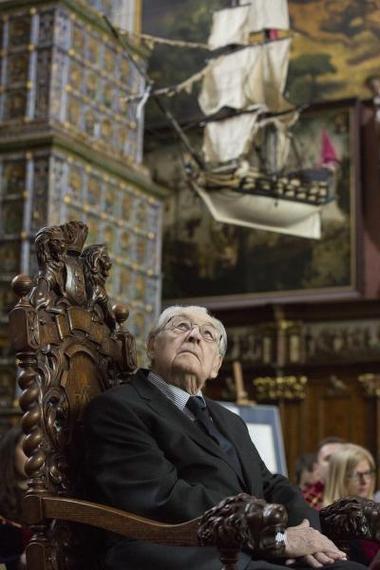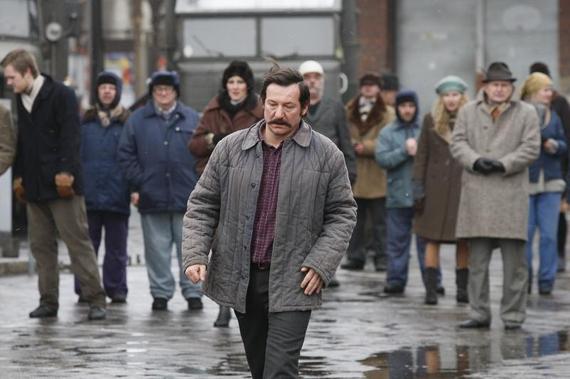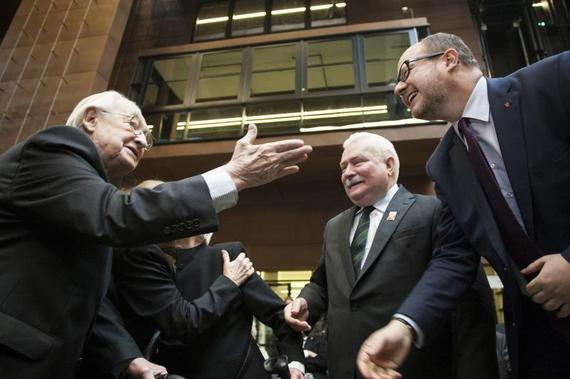Today, with sadness, I am participating in funeral ceremonies of Andrzej Wajda, a world acclaimed film director, and a great friend of Gdansk. He died on October 9th at 90 years of age. Agencies all over the world have been giving accounts of his life and many remembered his great life and films, including the Oscar he received for lifetime achievement in 2000.
 Andrzej Wajda, the Honorary Citizen of Gdansk. The King Arthur's Court in Gdansk. March 2016. Photo: J. Pinkas
Andrzej Wajda, the Honorary Citizen of Gdansk. The King Arthur's Court in Gdansk. March 2016. Photo: J. Pinkas
I feel a special affinity with Mr Wajda and a special obligation to him. Just several months ago, in January, I visited him in his home in Warsaw with the invitation to become an Honorary Citizen of Gdansk. He gladly agreed and happily recounted numerous times he had been in Gdansk, and how important our city is to him and his work.
Gdansk has a great relation with Andrzej Wajda, because the most important movies in his career were filmed in Gdansk and about Gdansk.
They clearly showed how important events in the history of Poland were inseparable from the myth and a genius loci of the place: its golden age in XV-XVII centuries, its proud status of Free City, and the place of the beginning of World War II. The breakthrough events of workers' strikes of December '70 and August '80 resulting in a birth of "Solidarity" took place here. There's no denying that the films that Wajda made in Gdansk are formative to generations of viewers. His "Man of Marble" and „Man of Iron" are films institutions. Indeed, it is hard to imagine the world cinema without Andrzej Wajda's input.
How happy were we when he agreed to come to Gdansk on his 90th birthday in March and received the Honorary Citizen Award in King Arthur's Court, the most representative building, so dear to Andrzej Wajda's heart. He knew many anecdotes from the period immediately following the war, when the fortunes of Gdansk's cultural heritage was decided. That's when I got to know him as a lively storyteller. We laughed at his colourful rendition of 1945 negotiations of Polish art historians with a Soviet commandant over a huge table in today's New City Hall. The matter was about saving as many as possible pieces of art from pre-war Gdansk from being taken away to the Soviet Union.
When he arrived in March for the award ceremony, we told him what a great honour for Gdansk residents it was to have him among us. In my speech I emphasised that the new Honorary Citizen of Gdansk for decades had taught Poles patriotism. Not the "textbook" one, however, but the difficult, sometimes tragic one.
The protagonists of his films are put in extreme situations, faced with crucial and most difficult choices. Importantly, Andrzej Wajda never proposes easy solutions. He teaches that patriotism is also a thoughtful reading of national literature and a constant reinterpreting it. It forces us to create independent thoughts and makes us who we are.
 On the filmset of "Walesa. Man of Hope". In the front of the train station in Gdansk. Robert Wieckiewicz starring as Lech Walesa. Photo: J. PinkasHow strange: he seemed eternal. At 90 he still made plans for new movies, joked and laughed. He left us with a gift: an Oscar nominee for the best foreign movie: Powidoki. We will be watching, of course. With sadness, with a feeling of great loss, with deep gratitude.
On the filmset of "Walesa. Man of Hope". In the front of the train station in Gdansk. Robert Wieckiewicz starring as Lech Walesa. Photo: J. PinkasHow strange: he seemed eternal. At 90 he still made plans for new movies, joked and laughed. He left us with a gift: an Oscar nominee for the best foreign movie: Powidoki. We will be watching, of course. With sadness, with a feeling of great loss, with deep gratitude.
Powidoki/Afterimage trailer:

